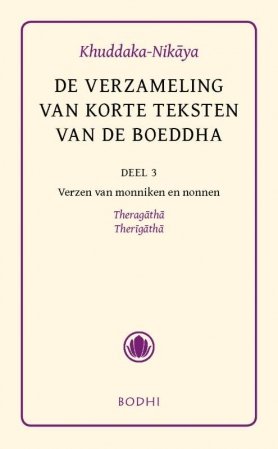This book contains the Dutch standard translation of two works that are part of the Khuddaka-Nikaya, ‘The Collection of Short Discourses of the Buddha’.
The Khuddaka-Nikaya is traditionally seen as – after the Digha, the Majjhima, the Samyutta and the Anguttara-Nikaya – the last of the five collections (nikayas) of the Sutta-Pitaka: the ‘basket’ (pitaka) of teachings (suttas) attributed to the historical Buddha and his main disciples.
The Sutta-Pitaka is part of the Pali-Canon together with the Vinaya-Pitaka (the ‘basket’ of the monastic rules) and the Abhidhamma-Pitaka (the ‘basket’ with detailed scholastic presentations of doctrinal material). Together they form the body of sacred texts of Theravada Buddhism. The Pali-Canon or Tipitaka (‘three baskets’) contain the oldest extant scriptures of the Buddhist tradition.
The Khuddaka-Nikaya is a heterogeneous collection of 15 works: Khuddaka-Patha, Dhammapada, Udana, Itivuttaka, Sutta-Nipata, Vimanavatthu, Petavatthu, Theragatha, Therigatha, Jataka Niddesa, Patisambhidamagga, Apadana, Buddhavamsa and Cariyapitaka. Some of these are among the most famous of Buddhist texts.
This book contains the complete translation of the Theragatha and Therigatha (‘Verses of monks and nuns’). This collection is part of the oldest scriptures in the Pali Canon. In this poetic literary work 264 men and 102 women describe their lives in the Buddhist community, their experiences with the meditation-practice, their problems and the way they experienced liberation or enlightenment. The verses are amongst the most personal documents of the entire Canon and appear to have lost none of their actuality, especially in the stories of the women.
